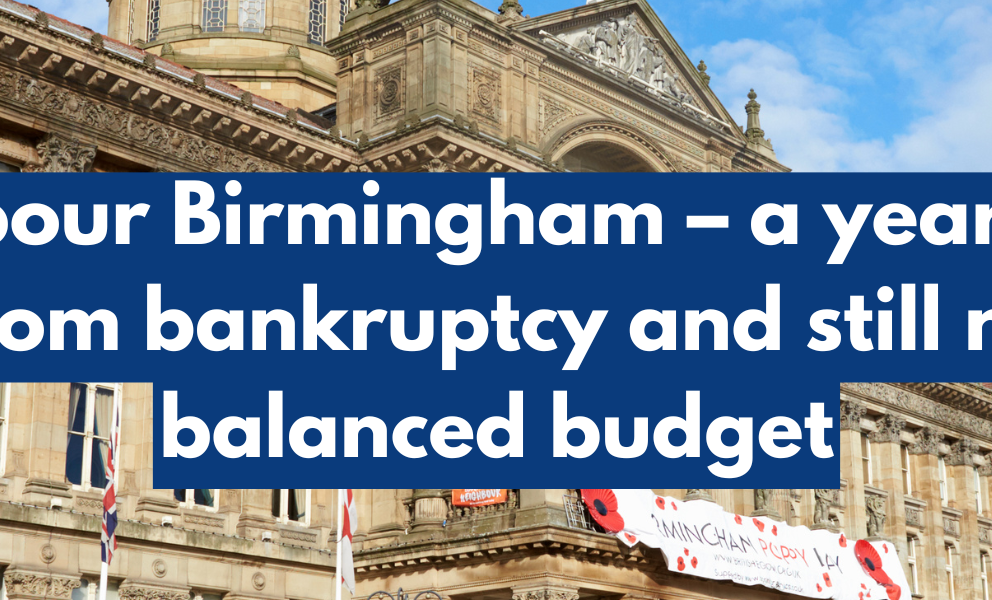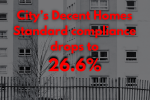Shadow Cabinet Member for Finance, Cllr Meirion Jenkins, writes for Conservative Home here:
Imagine what we would say about a Birmingham family or business that, having discovered they were spending more than they earned, carried on regardless without reducing spending to balance their budget. And yet, for some reason, the state tolerates this financial incontinence from Labour Birmingham City Council.
A year ago Birmingham City Council issued a Section 114 notice – effectively a statement of bankruptcy. Although a local authority can’t actually go bankrupt in the conventional private sector sense, it means that the authority expects to become unable to meet its day-to-day financial obligations as they arise.
A year on, it seems that little progress has been made. We still don’t have a balanced budget. Last autumn, Labour knew that we needed to shave £300 million off the current account. Labour identified £150m of savings, and not only did they not identify the other £150 million of savings, (let alone deliver them), this figure of £150 million has now grown to £195 million.
Labour just don’t deliver the savings. For example, as part of the cost savings Labour plans to close a number of libraries. This is very unpopular with residents but, nevertheless, that’s Labour’s policy to save money and balance the budget. Having talked about the closures for 12 months, Labour is now on its second round of consultations but not a pound has so far been saved.
Perhaps the best example of Labour’s incompetence is the Perry Barr athletes’ village. This was built for the Commonwealth Games but was so far behind timescale and budget, that no athlete ever stayed there. Most of the 1,400 units have now been sold off to a third party at an almost unbelievable loss of circa £400,000 per flat. The average value of a flat in this part of Birmingham is about £130,000. Moreover, the taxpayers in Birmingham are left still paying off the £360 million loan used to fund the majority of the construction over 40 years at a cost of about £17 million per annum. The paltry money that we did get from the sale, instead of part paying off the loan, has been used to fund the capitalisation direction (the Government gives permission for the sale of assets to meet current a/c costs) being used to meet the budget gap – so, basically, via a failed property speculation, we have ended up taking out a 40-year loan to part-fund our current account budget deficit.
Matters are greatly aggravated by the latest ‘equal pay’ dispute and Labour’s abject failure to implement a new Oracle accounting system – but we should be clear that Labour had created this ‘bankruptcy’ anyway, simply by failing to balance the current account. The extensive asset sales taking place are needed to fund an overall liability north of £1 billion.
‘Equal pay two’ is not really about equal pay in a crude sense, but rather an employer’s ability to pay different rates to people doing different jobs, where those jobs are predominantly done by one sex (e.g. can bin men earn more than cleaners etc.) In 2017 we warned that Labour’s policies were likely to create a second massive liability under the Blair era legislation that had already cost the authority £1.2 billion. In 2023, the liability was professionally estimated by the city’s finance director (S151 officer) and city solicitor, backed by extensive external legal advice at around £760 million.
Remembering that we would have been in Section 141 territory even without the equal pay issue, a few Labour members and now MPs (Liam Byrne asked a question in Parliament recently) are suggesting that the equal pay liability is overstated. Of course we don’t know what the final figure will be, but in all my time as a councillor I can’t remember an underestimate of costs at Birmingham City Council. Either way, the professionals have to be prudent; we cannot go forward on the basis of the most optimistic assumptions which is what some in Labour (typically) are arguing. Moreover the equal pay estimate was predicated on the new job evaluation scheme being in place by 1 April 2025, but we now know they are 4 months behind on evaluating the benchmarked roles as part of this programme.
Birmingham still doesn’t have a functioning accounting system, with officers trying to reach a point where the Oracle system is what they call “safe and compliant” (in 30 years + of implementing ERP systems, I have never heard this expression in this context), before then re-implementing the system in an attempt to get to the point where it delivers something like the advanced accounting, reporting, and integration benefits that are expected – a mere distant dream at present. The original budget was £20 million; years later we are now looking at over £140 million, not including all the consequential losses through service disruption, inability to chase debt, and lack of protection against fraud.
Labour is destroying Birmingham. Their financial failure is making the delivery of even basic services patchy or non-existent with dreadful customer service. I get numerous complaints from residents over matters that an efficient organisation could deal with in the regular course of business at the first enquiry. For example, because we can’t properly reconcile incoming cash payments and the bank account, we can’t maintain the residents’ council tax accounts properly, which means my residents are receiving demands for money that they dispute. I often help to get the cases sorted eventually, but it’s absurd that councillors should need to be involved in these simple administrative processes.
It seems highly likely that Labour in Westminster is on course to be the most unpopular government ever, and, therefore, combined with what must be the worst run council in the country, Birmingham’s all out election in 2026 may be a once in a lifetime opportunity for us to take control of the biggest core city. We are determined to fix what Labour has broken, but to achieve this we need help from the members and the Party; money and resources.



